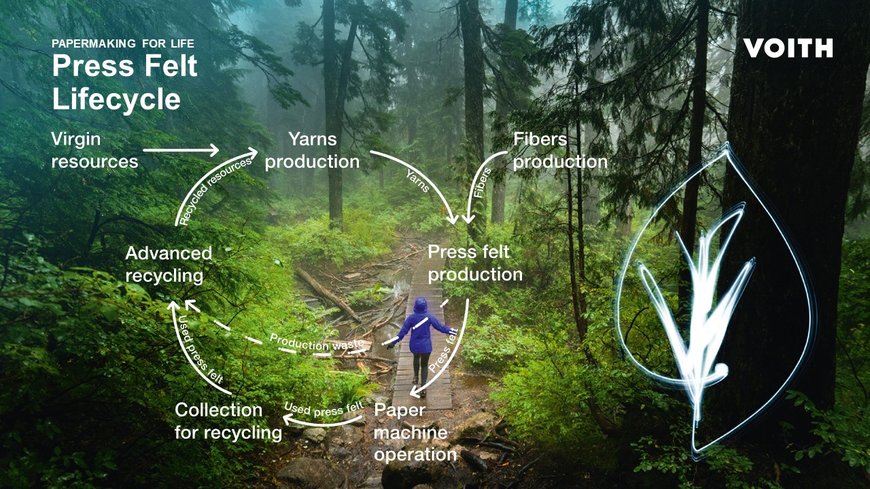Closed material loop: Voith intensifies efforts to recycle press felts
Recycling is firmly anchored in Voith Paper’s sustainability strategy to conserve resources and reduce CO2 footprint.

- Voith prioritizes material recycling in accordance with the EU Waste Directive and strives for a circular material cycle for press felts by collecting used felts, recycling them and reusing them for equivalent products (design for recycling)
- Recycling is also used in Voith’s own production to reduce primary raw material usage and ensure a sustainable production process
Recycling is a central component of Voith Paper’s sustainability strategy and forms the basis for a sustainable paper industry. With this in mind, the company is stepping up its activities in the area of reutilization and recycling of press felts in order to conserve resources, reduce waste and cut CO2 emissions.
“Our goal is to keep materials in the cycle and thus make a contribution to environmental protection,” explains Dr Robert Eberhardt, Senior R&D Manager Press & Materials at Voith Paper. “By consistently implementing the EU Waste Framework Directive (WFD), we prioritize material recycling over energy recovery (incineration) and thus make an important contribution to promoting the circular economy. This is not only in line with European requirements but is also in the interests of our customers, especially those who are striving for continuous improvement measures as part of their sustainability strategy.”
Recycling concepts for used press felts and the use of recycled materials in new products
Voith Paper has set the goal of integrating the cradle-to-cradle principle and creating a material cycle for press felts that is as closed as possible. In Europe, a considerable proportion of Voith felts are already recyclable. To this end, Voith Paper has introduced the “Design for Recycling” concept. As part of the concept, care is taken to use only recyclable materials throughout the entire product development and manufacturing cycle. In cooperation with partners such as Aquafil S.p.A., Voith has succeeded in an initial pilot phase in collecting used press felts from customers at the end of the product life cycle and successfully recycling them at Aquafil S.p.A through its regeneration process. The logistics concept is currently being developed and tested.
The manufacture of polyamide, the main material used in the production of press felts, yarns and fibers, is a very energy-intensive process. To eliminate the large carbon footprint of virgin nylon, Voith uses ECONYL® chemically recycled polyamide granulate sourced from its partner Aquafil S.p.A.. ECONYL-regenerated polyamide is made from waste materials, thereby eliminating oil cracking and various other production steps and significantly reducing environmental impact.
New polyamide yarns for felt production are manufactured from this granulate at Voith’s site in Summerville, S.C. in the United States. Voith then is starting to close the material cycle for press felts in Europe. The yarns made from 100 percent recycled material reduce the CO2 footprint by 80 percent compared to yarns made from virgin material.
A pilot project to introduce the yarns is currently being carried out in Högsjö, Sweden. The aim is to initially use the yarns in the three-digit tonne per year range. Quality remains a top priority when utilizing recycled polyamide yarns. Lidia Loskan, R&D Project Manager Sustainability at Voith Paper, confirms this: “In terms of quality, there is no difference between the yarns we use made from new versus recycled material. Maintaining the quality standard was decisive for us when introducing the concept at Voith Paper.”
Recycling also in our own production
Voith Paper’s recycling efforts also extend to the utilization of production waste in European locations. This waste, including yarn remnants, fiber and edge trimmings from felt production, is also recycled and returned to the material cycle. This is now possible without any problems following the implementation of the “Design for Recycling” concept.
Robert Eberhardt concludes: “We are proud to be able to offer the paper industry a closed material loop for press felts in the future and thus significantly reduce the ecological footprint of our products. Our efforts in the area of recycling help to promote the circular economy and increase resource efficiency, which is crucial for a sustainable future for our industry.”
www.voith.com

